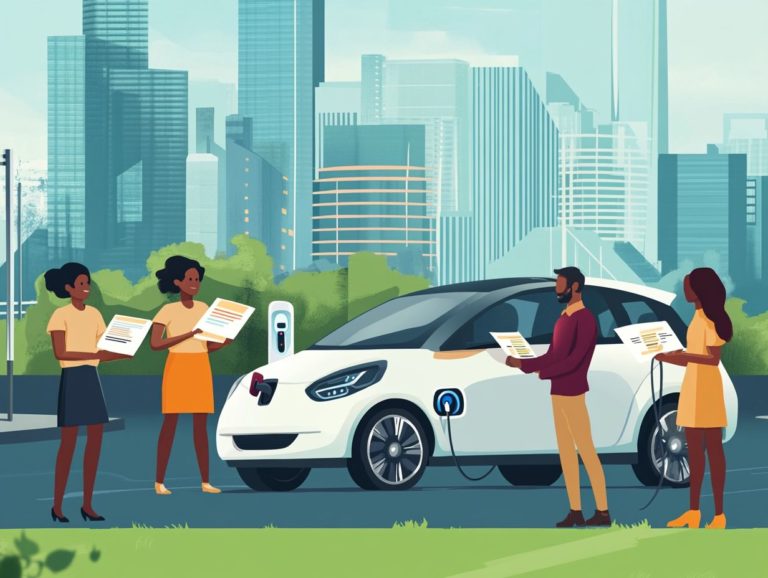The Role of Battery Technology in EV Sustainability
Electric vehicles (EVs) play a crucial role in fighting climate change. Understanding battery technology is essential for grasping their impact.
This article explores the various types of batteries powering today s EVs. It also highlights recent advancements that enhance their sustainability.
You ll discover how improved battery efficiency leads to lower carbon emissions. At the same time, we will confront the ongoing challenges, including environmental concerns and infrastructure hurdles.
Look ahead at the future of battery technology and its implications for sustainable transportation. Exciting innovations are shaping the next generation of eco-friendly mobility.
Contents
- Key Takeaways:
- Battery Technology in EVs
- Impact of Battery Technology on EV Sustainability
- Reducing Carbon Emissions
- Extending Battery Life and Efficiency
- Challenges and Limitations of Battery Technology
- Environmental Concerns
- Future of Battery Technology in EVs
- Frequently Asked Questions
- What is the role of battery technology in EV sustainability?
- How does battery technology contribute to reducing carbon emissions?
- What types of batteries are used in EVs?
- How does battery technology impact the longevity of EVs?
- What are the challenges facing battery technology in terms of EV sustainability?
- Can battery technology be used for other forms of sustainable transportation?
Key Takeaways:
- Battery technology is vital for reducing carbon emissions and increasing efficiency in EVs.
- Advancements in battery technology will lead to longer battery life and greater overall sustainability of EVs.
- Despite its benefits, battery technology faces challenges such as environmental issues and costs. However, innovations offer hope for a more sustainable transportation future.
Overview of EV Technology and Importance of Sustainability
Electric vehicles (EVs) have become essential to sustainable technology. They help reduce the environmental harm caused by traditional cars.
Your transition to EVs is driven by the urgent need to combat climate change. It aligns with global commitments like the Paris Agreement, which aims to lower greenhouse gas (GHG) emissions.
Embracing renewable energy sources and energy-efficient practices in the design and manufacturing of electric vehicles is crucial. This approach ensures lasting environmental sustainability.
By choosing these cleaner options, you can significantly reduce your carbon footprint. Research shows that switching from an internal combustion engine vehicle to an electric one can cut CO2 emissions by about 50% over its lifetime.
Innovations in battery technology, such as solid-state batteries (a new type of battery that can offer better performance and safety), are set to improve energy efficiency and range, making EVs even more attractive.
Renewable energy sources are becoming more common in EV charging infrastructure. This shift further reduces reliance on fossil fuels.
Recent statistics reveal that over 70% of the electricity used for EV charging in certain areas comes from renewable sources. This fact emphasizes the positive relationship between electric vehicles and sustainable energy practices.
Battery Technology in EVs
Battery technology lies at the core of electric vehicles (EVs), delivering the vital energy storage solutions that power these sustainable machines. Understanding the role of governments in promoting EV sustainability can further enhance the impact of these innovations.
The evolution of batteries, especially lithium-ion batteries, has led to remarkable advancements in energy efficiency and power density. These changes have greatly enhanced the performance and range of electric vehicles.
As an OEM, you may find yourself increasingly interested in alternative battery technologies. Options like nickel-metal hydride and solid-state batteries promise improved energy recovery and cost reduction while maintaining high energy density.
Types of Batteries Used
The main batteries in electric vehicles (EVs) are lithium-ion, nickel-metal hydride, lead-acid, and ultracapacitors. Each type has unique benefits for different uses.
Lithium-ion batteries are the most common in the EV market. They allow for longer ranges and faster charging times, making them ideal for electric models.
Nickel-metal hydride batteries are often found in hybrid vehicles. They offer a good balance of cost and performance for less demanding driving situations.
While lead-acid batteries are heavier and less efficient, they remain important for budget-friendly electric vehicles. Ultracapacitors enhance efficiency by quickly charging and discharging energy, perfect for high energy bursts during braking.
These advancements enhance EV performance and promote sustainability, reducing fossil fuel reliance and increasing battery material recycling.
Advancements in Battery Technology
Recent advancements in battery technology, particularly the emergence of solid-state and sodium-ion batteries, are set to transform the electric vehicle (EV) landscape. They improve both energy efficiency and sustainability.
Solid-state batteries offer superior energy density and safety features, addressing the limitations of lithium-ion batteries. Additionally, sodium-ion batteries present a more abundant and environmentally friendly alternative.
Battery recycling initiatives are essential for reducing waste and fostering a commitment to environmental sustainability.
These cutting-edge technologies promise longer ranges and quicker charging times while addressing critical environmental issues linked to conventional battery materials. Transitioning to more sustainable materials reduces reliance on scarce resources and diminishes the ecological footprint of EV production.
However, challenges like scaling production processes and ensuring the economic viability of these innovations present significant hurdles to widespread adoption. Continued investment in research and collaboration among stakeholders is essential for unlocking the full potential of advanced battery solutions, paving the way for a greener future in transportation.
Impact of Battery Technology on EV Sustainability
The influence of battery technology on the sustainability of electric vehicles (EVs) is significant. It directly affects their carbon emissions, energy efficiency, and overall environmental footprint, making it essential to explore understanding the sustainability of EV batteries.
By embracing advanced battery chemistries and improving energy storage capabilities, manufacturers can create electric vehicles that deliver superior performance while significantly lowering greenhouse gas emissions.
Battery recycling initiatives are essential for reducing waste and fostering a commitment to environmental sustainability.
In conclusion, staying informed about advancements in battery technology is crucial. Join the revolution in battery technology and act now to embrace a greener future!
Reducing Carbon Emissions
Reducing carbon emissions is a key goal in the evolution of electric vehicles (EVs). This shift is largely driven by advancements in battery technology. By using high-energy density batteries, such as lithium-ion, and exploring alternatives like solid-state batteries, you can help create EVs with lower carbon footprints and contribute to global efforts against climate change. It’s also essential to integrate energy-efficient practices throughout the production process to minimize emissions.
Innovative recycling methods for battery materials are emerging, which significantly reduce the environmental impact associated with raw material extraction. Companies like Tesla and BMW are taking the lead by investing in closed-loop systems that repurpose and recycle battery components, ensuring sustainability at every turn. By leveraging smart grid technologies, you can optimize charging strategies that further lower emissions throughout the vehicle s lifecycle.
Successful initiatives, such as Volkswagen s ID. Family, not only demonstrate reduced carbon outputs but also promote wider consumer adoption of greener technologies. This illustrates how advancements in battery technology and sustainable practices are transforming the automotive landscape.
Extending Battery Life and Efficiency
Extending battery life and efficiency is crucial for enhancing the performance and sustainability of electric vehicles (EVs). This is especially important given the common use of lithium-ion batteries. Exciting new innovations in battery management systems help you optimize energy usage and prolong battery lifespan. This approach not only reduces the frequency of replacements but also aligns with sustainable technology goals by promoting battery recycling and minimizing waste.
Recent developments have introduced solid-state batteries, which provide higher energy densities and improved safety features by replacing liquid electrolytes with solid materials. By integrating smart algorithms powered by artificial intelligence, your EV can learn your driving patterns and optimize energy use accordingly. Solar panel integration is also gaining traction, allowing vehicles to harness renewable energy while parked.
These technological advancements not only improve battery efficiency but also play a significant role in reducing the carbon footprint of transportation. As these innovations continue to grow, they promise to transform the EV market and pave the way for a greener future.
Challenges and Limitations of Battery Technology
Despite the remarkable strides in battery technology, several challenges still persist. These hurdles prevent electric vehicles (EVs) from reaching their full potential as a sustainable transportation solution.
Concerns about the environmental impact of battery production and disposal, the high costs of emerging technologies like solid-state batteries, and the lack of sufficient infrastructure for charging and battery recycling all represent significant obstacles.
Tackling these issues is vital for paving the way toward a truly sustainable future for electric vehicles.
Environmental Concerns
As electric vehicles (EVs) become more prevalent, environmental concerns regarding battery production and disposal are gaining attention. This situation highlights the importance of adopting sustainable technology practices. The extraction of essential raw materials like lithium and cobalt poses ecological challenges. Improper battery disposal can lead to environmental degradation and contribute to a larger carbon footprint. To mitigate these issues, effective battery recycling programs are crucial for promoting environmental sustainability.
Given the rising demand for lithium-ion batteries, it’s essential to consider the entire lifecycle of these technologies. From mining operations that often disrupt local ecosystems to the eventual fate of batteries that end up in landfills, the impact on our planet is significant.
Innovative recycling initiatives not only aid in recovering valuable materials but also play a key role in reducing the energy consumption linked to new battery production. By embracing a circular economy, you can help ensure that old batteries are either repurposed or recycled, minimizing waste and conserving resources. This approach contributes to a more sustainable future for everyone.
Join the movement towards sustainable transportation by supporting battery recycling initiatives!
Cost and Infrastructure Challenges
Cost and infrastructure challenges are significant barriers to the widespread adoption of electric vehicles (EVs), especially concerning battery technology. The high production costs of advanced battery materials, such as solid-state batteries, can stifle market penetration.
Meanwhile, insufficient charging infrastructure undermines consumer confidence and convenience. Original Equipment Manufacturers (OEMs) face the daunting task of navigating these hurdles to build a sustainable ecosystem for electric vehicles.
The economic obstacles extend beyond production costs; they also include ongoing operational expenses that weigh heavily on your decision to switch to electric. For example, the scarcity of charging stations, particularly in rural areas or underserved urban locales, deters potential buyers and raises concerns about the practicality of long-distance travel.
To tackle these issues, various initiatives have emerged. Governments are rolling out enticing incentives to promote electric vehicle use, and public-private partnerships are working to expand charging networks.
Moreover, companies are investing in innovative battery recycling methods, which promise to lower costs and enhance sustainability. These efforts aim to create a more favorable environment for your electric vehicle journey.
Future of Battery Technology in EVs
The future of battery technology in electric vehicles (EVs) looks incredibly exciting, fueled by continuous innovations and a growing demand for sustainable transportation solutions. Researchers and manufacturers are focusing on developing next-generation battery technologies like lithium-sulfur and iron-air batteries. You stand to benefit from substantial improvements in energy storage, efficiency, and environmental sustainability.
Successfully integrating these advancements will be vital for enhancing EV performance and driving broader adoption.
Potential Solutions and Innovations
Innovations in battery technology are set to revolutionize electric vehicles (EVs), turning them into more efficient and sustainable modes of transportation. Innovations like sodium-ion and solid-state batteries offer improved safety, enhanced energy density, and superior recycling capabilities, addressing key issues linked with current technologies.
These advancements are essential for minimizing the overall environmental impact of electric vehicles. Additionally, keep an eye on emerging technologies such as lithium-sulfur and flow batteries. These innovations provide exciting opportunities for extending battery lifespan and improving charge cycles.
Not only could these technologies expand driving ranges, but they might also reduce reliance on scarce materials like cobalt. However, the journey to widespread adoption isn’t without challenges, including manufacturing scalability and initial costs.
Tackling these hurdles is crucial to ensure that the shift toward more sustainable energy sources aligns seamlessly with global sustainability goals. This ultimately paves the way for a cleaner, greener automotive future.
Implications for the Future of Sustainable Transportation
The future of sustainable transportation holds remarkable promise as battery innovations advance alongside electric vehicles (EVs). Breakthroughs in battery technologies, such as solid-state and sodium-ion batteries, will dramatically improve energy storage and efficiency. To learn more about these advancements, including understanding battery life in electric vehicles, this evolution will reshape sustainable transportation, steering it toward lower carbon emissions and enhanced environmental sustainability.
As a result, you’ll witness broader acceptance of electric vehicles, fundamentally transforming urban mobility. These technological advancements will influence policy decisions significantly. Governments will likely respond by implementing stricter emissions regulations and creating incentives for manufacturers and consumers. Improved battery efficiency will also lead to a more developed charging infrastructure, addressing the issue of range anxiety.
As more people realize the benefits of going green, your choices may shift toward EVs, driving demand even higher. This collective shift can ignite urban planning initiatives focused on integrating electric public transport systems. Ultimately, this will foster cleaner air and create more efficient cities.
Frequently Asked Questions
What is the role of battery technology in EV sustainability?
Battery technology is crucial for electric vehicles (EVs) as it provides the necessary power to run the vehicle and reduces reliance on fossil fuels. Understanding why EVs are crucial for a sustainable future highlights the importance of this technology.
How does battery technology contribute to reducing carbon emissions?
Battery technology powers EVs, reducing the use of gasoline or diesel vehicles that emit harmful carbon emissions. This makes EVs a more environmentally friendly transportation option.
What types of batteries are used in EVs?
The most commonly used battery type in EVs is lithium-ion batteries, known for their high energy density and rechargeability. Other types, like nickel-metal hydride and solid-state batteries, are also being developed.
How does battery technology impact the longevity of EVs?
Battery technology significantly affects the lifespan of an EV. Advances are increasing the range and durability of EVs, making them a more viable long-term transportation option.
What are the challenges facing battery technology in terms of EV sustainability?
One main challenge is the limited availability of raw materials like lithium and cobalt, essential for battery production. Efforts are underway to develop sustainable and affordable alternatives.
Can battery technology be used for other forms of sustainable transportation?
Yes, battery technology extends beyond EVs. It’s used in electric buses, trains, and for storing renewable energy in solar and wind power systems.
In conclusion, the advancements in battery technology are pivotal for sustainable transportation. As we embrace these changes, consider the benefits of electric vehicles and explore the role of electric vehicles in sustainable development for a greener future.





